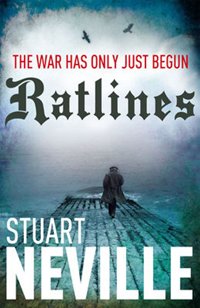 Today sees the release of Stuart Neville’s fourth book, Ratlines. Just as James Ellroy picked at the scab of America’s political upheavals in the 1960s – from the Bay of Pigs to the assassinations of Martin Luther King Jr, and the Kennedys – in his Underworld trilogy, here Neville ambitiously digs around in Irish history during the same period. What you’ll discover is a story of corruption and intrigue involving Nazis who sheltered in Ireland after WWII, terrorists, assassins, mercenaries and Irish politicians. It’s quite a departure from his Jack Lennon police stories, set in Belfast. So we invited the Armagh-born writer over to talk about Ratlines, and more…
Today sees the release of Stuart Neville’s fourth book, Ratlines. Just as James Ellroy picked at the scab of America’s political upheavals in the 1960s – from the Bay of Pigs to the assassinations of Martin Luther King Jr, and the Kennedys – in his Underworld trilogy, here Neville ambitiously digs around in Irish history during the same period. What you’ll discover is a story of corruption and intrigue involving Nazis who sheltered in Ireland after WWII, terrorists, assassins, mercenaries and Irish politicians. It’s quite a departure from his Jack Lennon police stories, set in Belfast. So we invited the Armagh-born writer over to talk about Ratlines, and more…
Was it a wrench to leave behind DI Jack Lennon as seen in Collusion and Stolen Souls, and might he reappear at some point?
I enjoyed taking a break from the Belfast setting and writing something very different, though Ratlines is still very much a thriller. If and when I return to Jack Lennon, it’ll hopefully be from a fresh perspective. I’m pretty sure he’ll be back in one way or another.
What are the attractions and pitfalls of including real historical characters in a novel?
I’ve always enjoyed novels that take a sideways look at real people, like those by James Ellroy and Eoin McNamee. People like Otto Skorzeny and Charles Haughey really are gifts as characters, though because they were very much larger than life men, it was tricky not to stray into caricature.
Did you feel in any sense that you were playing with fire, as an Ulsterman, by writing about The Republic’s rather ambiguous relationship with Germany during and after World War II?
Given that the book is set 50 years ago, I’m okay about writing about this period in the Republic’s history. I would be hesitant to set a story in present day Dublin, just because I’m not a native of the city. But as the saying goes, the past is a foreign country, and those 50 years mean no writer from south of the border has a greater claim to this story than anyone from the north.
Albert Ryan, the main character in Ratlines, fought bravely for the Allies during the War, and his family pays a price for this. How would the fictional Albert feel about the recent apology by the Irish Government for the way his fellow soldiers were punished for fighting the Nazis?
I think he’d be happy about the apology, but happier that Irish society in general has moved on from the old animosities. The last few years have seen a greater acknowledgement of Britain and Ireland’s shared history, which is healthy for both nations.
 I have to confess, I fell madly in love with Celia Hulme in Ratlines. Is there any chance that we might see her again?
I have to confess, I fell madly in love with Celia Hulme in Ratlines. Is there any chance that we might see her again?
If Albert Ryan returns, which I hope he will, then Celia will be by his side. There is a short story that was written before Ratlines, called The Craftsman, about Albert and Celia in their elder years. A short film was adapted from it earlier this year by an up-and-coming director. The story is available online if anyone cares to search for it, though be warned: it doesn’t have a happy ending.
You get the call from a TV producer. They want to make a four hour mini-series of Ratlines. Cast Albert, Celia and Skorzeny for us. (Modern actors only – budget no problem!)
I don’t normally like casting my books, but I’ve actually written a screenplay for the first of a three part adaptation of Ratlines, so I’ve given this some thought. Chris O’Dowd for Albert Ryan, Kiera Knightley for Celia Hume, and Liam Neeson for Otto Skorzey. You can’t say I’m not ambitious! You didn’t mention Charles Haughey, but I’d like Aiden Gillen for him.
You recently took a bold stand against fake and destructive reviews on Amazon. Will your efforts, and those of other authors, have put a stop to this practice?
I hope authors will at least think twice before doing that sort of thing. They’ve got to realise it’s not worth the potential embarrassment of being caught out.
There seem to be so many potently symbolic people, places and events in Irish cultural history, such as Croke Park in Ratlines. Are these a help or a hindrance in your writing?
They can be a help in that they act as cultural waypoints, recognisable things like the impending JFK visit that help readers grasp the place and time. But there is a danger of them becoming a crutch, too, a shortcut to building the setting. I hope I got the balance right.
Which other writers do you admire, and do you have any literary or stylistic influences?
The aforementioned James Ellroy has been a big influence on me, and his Underworld USA trilogy was what I was aspiring to with Ratlines. Taking a moment in history and using it as a framework for a work of fiction. I’m also a fan of British crime writer Ted Lewis, and I think he’s very sadly underrated.








